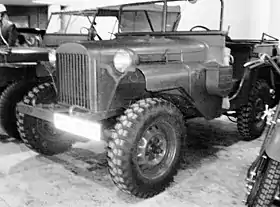GAZ-64
The GAZ-64 was a 4x4 vehicle made by GAZ (Gorkovsky Avtomobilny Zavod, translated as Gorky Automobile Plant, which originally was a cooperation between Ford and the Soviet Union), succeeding the earlier GAZ-61. Its design was led by Vitaliy Grachev. The design process was exceptionally quick, taking only a few weeks.
| GAZ-64 | |
|---|---|
 A 1941 GAZ-64 | |
| Overview | |
| Manufacturer | GAZ |
| Production |
|
| Body and chassis | |
| Body style | jeep |
| Layout | F4 layout |
| Related | BA-64 |
| Powertrain | |
| Engine | 3.3L GAZ M1 I4 |
| Chronology | |
| Predecessor | GAZ-61 |
| Successor |
|
Design

The curb weigh of the car was 1,200 kg (2,646 lb). It was powered by a 3285 cc, inline-4 engine giving 50 hp (37 kW) and a top speed of 100 km/h (62 mph).[1][2] It was produced using existing commercially available parts.[3]
Development
The GAZ-64 was developed from a requirement developed during the 1939-1940 war between the Soviet Union and Finland. Although it appears outwardly similar to the American Bantam / Willys jeep, it was developed using parts already commercially available in the Soviet Union, and built in a plant that was originally set up with Ford.[3]
It was designed to replace the earlier GAZ-61, which was totally reconstructed in a very short period (3 February – 25 March 1941) under the leadership of Vitaly Grachev to create a 4×4 jeep, which was named the GAZ-64. During WWII, it was succeeded by the more successful GAZ-67 and GAZ-67B. The GAZ-64 and GAZ-67 formed the basis for the BA-64 armoured cars.[1][2]
Production
646 GAZ-64s were made between March 1941 and summer 1942 by the GAZ or Gorkovsky Avtomobilny Zavod company. The name translates as the Gorky automobile plant, and the factory was originally a cooperation between the company Ford and the Soviet Union.[1][2]
Due to the availability of American made jeeps provided by the American Lend-Lease program, the majority of wartime production of the GAZ-64 was dedicated to the BA-64 armored cars. Due to GAZ-64 (and GAZ-67(B) from 1943/1944) production being tied to BA-64 production, only around 2,500 regular units were produced during the war. Post-war production increased greatly, and more than 90,000 GAZ-67Bs were produced by the time production ended in 1953.[3]
References
Citations
- Thompson, p. 31.
- Pročko (2005)
- Jeeps 1941–45 By Steven J. Zaloga. P.38-39